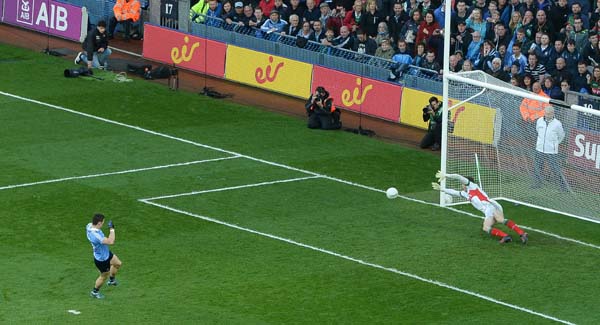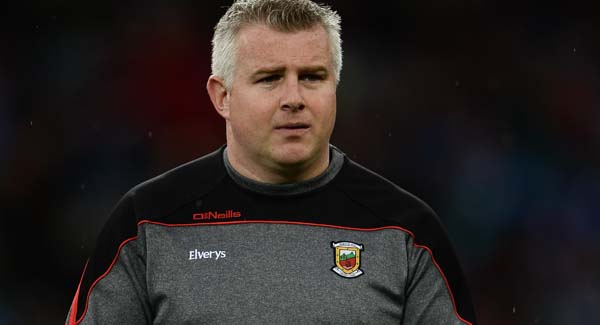Concerted campaign or just a confluence of opinions?
Stephen Rochford, for one, has no doubt but that the drip feed last week of ex-Dublin players publicly dissecting Lee Keegan’s marking job on Diarmuid Connolly in the drawn All-Ireland final amounted to nothing less than an agenda, writes Brendan O’Brien of the Irish Examiner.
Ciaran Whelan had spoken about the need for referees to look for the instigator, Paul Clarke accused Keegan of ‘conceding his footballing ability’ and Alan Brogan claimed the Westport man was getting away with more than he should. Ger Brennan had a say, too.
It certainly amounted to a synchronised chorus over the course of 13 days and it all made for a loaded backdrop when Connolly went down — rather easily it must be said — under pressure from his marker 20 minutes into the replay.

Who can say if any of those opinions played, even sub-consciously, on the mind of referee Maurice Deegan as Connolly went to ground and a slew of Dublin players and thousands of their supporters demanded action?
“Lee Keegan is one of the most mentally tough, honest-to-God football guys I have ever met,” said Rochford. “I don’t think (the talk) knocked a breeze out of him, but I am under no illusions that there was an agenda out there.
“It is unfortunate that former players would feel it necessary to get into that. Guys that haven’t always been whiter than white but, look, that’s for them to deal with their own consciences.”
Former Mayo midfielder David Brady had described it all as “orchestrated” though that lends a rather Machiavellian air to what was more likely a case of individual former players viewing a key subplot through the same blue prism.
“I don’t know, ahem, it is coincidental,” said Rochford. “Four or five days in a row. So be it.”
Whether a campaign or coincidence, the consequence of Keegan’s black card was obvious and not only because he had utterly negated Connolly’s influence in that opening quarter and claimed the game’s first goal for himself.
Rochford, as he had been on Saturday evening, was at pains yesterday to divert attention away from from individual refereeing decisions and he flat out rejected talk of ill-fortune in analysing Mayo’s latest heartbreak.
What he did say was that Keegan’s card was harsh and that the disproportionate influence of one split-second decision on a game of such importance again begs the question as to whether referees should have the aid of a video review or TMO.
“To my knowledge, there is maybe up to 10 or 12 people on interaction ear pieces and microphones,” Rochford said.
“Out of those 12 there is definitely scope for somebody to be looking at a video clip saying: ‘Maurice, it’s not as clearcut as we thought here’. Or it is.

“Or maybe like in the rugby where they say: ‘My position on the field is this: Can you assist?’ Thirty seconds probably gives you a fair indication. Look at how long it has taken for a card, it is taking them probably a minute. So while he is gathering his thoughts or communicating, (he could say): ‘Look, I have a position here. Can we confirm it or not?’ Is it blatant or is it not?”
Thing is, no one action occurs in a vacuum.
Rochford hadn’t revisited the game on DVD come yesterday morning but he didn’t need to. He could already trace Keegan’s misfortune and his side’s eventual demise to a a spider’s web of events that started with a soft turnover on Dublin’s 45.
What followed was Keegan’s departure, the concession of two points from Dean Rock frees and the incident which led to Donal Vaughan’s injury and the concussive symptoms that led to his replacement at half-time.
A harsh payload for one error in a game of such minute margins.
Losing two such mobile, attacking and generally influential players was debilitating enough but doing it at those early junctures left Mayo short of options.
“They rattled us a little bit more than what we thought at that moment,” Rochford suggested.
Yet none of the blows were fatal.
Mayo only trailed by a point at the break and they led by that same margin six minutes into the second period before Rob Hennelly spilled an innocuous ball in by Paul Flynn and felt compelled to fell Paddy Andrews a split-second later.
Rochford didn’t gloss over the impact of Connolly’s subsequent penalty. With the lead restored, Dublin were happy to circle the wagons with 12 or 13 men behind the ball and catch Mayo on the counter into wide open prairies.
The lead wouldn’t change hands again.
So, Hennelly’s mistake was unquestionably a seismic moment in a game of countless tremors and it ensured that the already controversial decision to replace David Clarke with the Breaffy man would be held up to an unforgiving light in the aftermath.
Rochford added some balance to the court of public opinion by pointing out that it was a deep kick from Hennelly to Donal Vaughan that had started the move for Keegan’s goal but those shades of grey tend to be lost in the wash.
“It was an opinion by management,” he said of the controversial switch.
“We lost the game by a point. If we had won the game by a point it didn’t mean that the decision was right either. It was an opinion taken by management. That’s the one position that’s coming under scrutiny today and maybe rightly so.”


